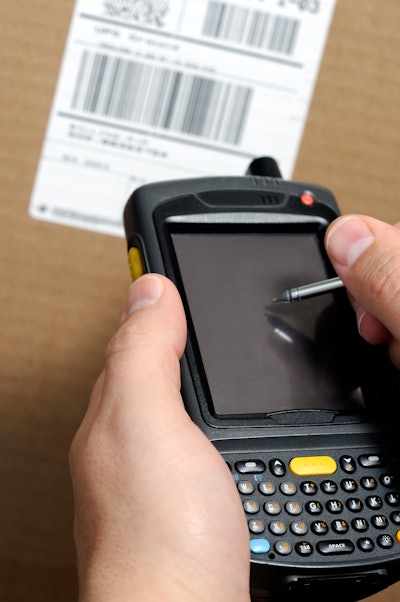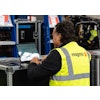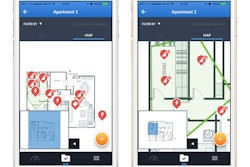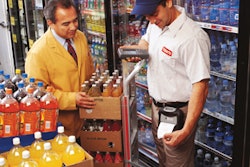The intricacy of the food supply chain depends on the right technology to keep track of food products and to keep everything safe and traceable. Considering the expectations and standards of consumers and the Food and Drug Administration (FDA) regulations, food manufacturers and distributors must deploy technology implementations throughout the supply chain to ensure they are providing transparency and accurately tracking product along the entirety of its journey, from source to table.
Modern-day technologies, like mobile ruggedized devices equipped with scanners and enterprise software or consumer-grade mobile devices, allow companies to ensure food quality and safety while feeding data into an overall enterprise system, giving employees access to data in real-time and allowing business leaders to make smarter decisions based on that data. With an estimated three-quarters of Americans owning a smartphone, mobile devices are commonplace, making them extremely easy for companies to deploy and train new employees.
Mobile devices and mobile applications are becoming particularly popular in the food industry for their reliability, ease of use and ability to transmit real-time data to the entire enterprise. Tracking inventory, production and product quality are all essential to maintaining a successful food distribution business and these technologies enable that. Mobilizing enterprise resource planning (ERP) provides food manufacturers and distributors with a variety of mobile apps to maximize worker productivity, which ultimately improves the bottom-line and increases customer satisfaction.
The intricacy of the food supply chain depends on the right technology to keep track of food products and to keep everything safe and traceable. Considering the expectations and standards of consumers and the Food and Drug Administration (FDA) regulations, food manufacturers and distributors must deploy technology implementations throughout the supply chain to ensure they are providing transparency and accurately tracking product along the entirety of its journey, from source to table.
Modern-day technologies, like mobile ruggedized devices equipped with scanners and enterprise software or consumer-grade mobile devices, allow companies to ensure food quality and safety while feeding data into an overall enterprise system, giving employees access to data in real-time and allowing business leaders to make smarter decisions based on that data. With an estimated three-quarters of Americans owning a smartphone, mobile devices are commonplace, making them extremely easy for companies to deploy and train new employees.
Mobile devices and mobile applications are becoming particularly popular in the food industry for their reliability, ease of use and ability to transmit real-time data to the entire enterprise. Tracking inventory, production and product quality are all essential to maintaining a successful food distribution business and these technologies enable that. Mobilizing enterprise resource planning (ERP) provides food manufacturers and distributors with a variety of mobile apps to maximize worker productivity, which ultimately improves the bottom-line and increases customer satisfaction.
As mobile technology continues to increase in popularity, new mobile apps designed to simplify processes for employees continue to improve the food industry across the board. Today, mobile apps such as proof of delivery, on-the-go route sales, inventory management, warehouse management systems (WMS), and direct-to-store delivery are especially prominent in the food industry.
Read on to see why companies looking to enhance efficiencies and modernize operations should deploy mobile applications and technology throughout the supply chain.
Ease of Use
While some people may not be ready to modernize their IT systems, mobile applications bring the familiarity of commercial or consumer mobile devices to the warehouse floor. These mobile apps were designed for a handheld, touchscreen device, and they provide uncomplicated and simple ways to do work and view information.
In the food industry where product may be handled by numerous employees throughout the organization, it is critical that all employees know how to use the technology necessary for the job and that they feel comfortable using it. Some existing enterprise technology can be time-consuming or difficult to train employees on, but new mobile apps make the implementation process much smoother and easier to use than legacy software that can be less user-friendly. With these apps available on mobile devices, employees can scan an item and input the necessary data into the system directly, rather than writing it down and transferring it into a system at a later time, which often leads to mistakes or inaccurate information.
The simplicity of these modern technologies takes the stress away from spending hours on extensive training and frees up critical employee time to manage more value-added tasks that will benefit the business in the long run.
Increase Revenue and Enhance Productivity
Mobile apps can provide cost savings and are a smart investment for the future because they are task specific and can be easily updated, unlike many legacy enterprise technologies. Whether a business is just starting up or has been around for over a century, mobile apps fill the need of every organization working along the supply chain and are crucial for success in the digital world we live in. Mobile technology can have a very high return on investment because it is not necessarily as expensive as other technologies and can be quickly deployed at a large scale.
For companies with multiple locations, mobile apps like on-the-go route sales and order processing keep the multi-location network connected throughout the day, so time isn’t wasted trying to sort through tedious logistics. When dealing with perishable items, it’s vital that processes be conducted in a timely and an efficient manner and that product is accurately accounted for along the way. These apps also ensure that inventory is accurate so that customers are receiving the correct orders with a precise amount of product.
With the efficiencies that mobile apps provide, employees are able to do their jobs faster and more precisely. When employees are equipped with mobile technology throughout an organization, they’re able to work more efficiently, stay connected to one another, meet regulatory requirements, and gain access to a real-time view of the entire company.
Meet FDA Requirements
The U.S. Department of Agriculture (USDA) estimates that food-borne illnesses cost more than $15.6 billion each year, so companies working in the food industry must ensure that all safety compliances are met throughout the supply chain. This is critical because any mistakes can cause a disruption in operations, resulting in potential lost revenue.
The FDA’s Food Safety Modernization Act (FSMA) requires companies to provide digital records of all procedures and transactions that occur, which can be extremely difficult for companies to comply with if they do not have the appropriate tools in place. Mobile inventory management and lot and date tracking apps ensure that organizations can trace a product from its origin to the moment it gets to its destination, helping to meet increasingly stringent federal regulations.
With numerous items moving through the supply chain on a daily basis, keeping track of lot information and shelf-life dates can be made simple with mobile technology as the information goes directly into the system, reducing the possibility for mistakes and enhancing efficiencies.
Real-Time Data Capture and Analysis
Real-time data capture is imperative for food companies today. By ensuring that all data is being captured along each part of the supply chain process, organizations can provide transparency to customers, meet all FDA regulations and allow orders to be fulfilled and processed in a more time-efficient manner.
With companies always having to rely on data to make business decisions today, these data capture capabilities also make for smarter decisions based on insights and more real-time responses to changes in the supply chain. Employees can access real-time data and can make adjustments to inventory or fill rates based on data that is being transmitted from workers across the supply chain. These mobile enterprise systems also automate time-consuming tasks like data capture and data analysis, which allow employees to spend more time looking at the bigger picture and making decisions that will positively impact the future of the company.
Implementing mobile apps into everyday work processes will ultimately improve efficiencies, lead to smarter business decisions, keep regulators informed and your customers happy. As the market continues to modernize and more companies transform digitally, mobile applications will become the preferred tool for data entry for companies across industries. Also, mobile technologies connected to the Internet of Things (IoT) will continue to provide even more advantages and optimize the future of work, especially in the food industry.




















